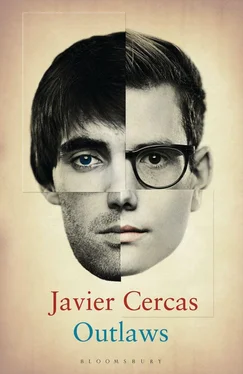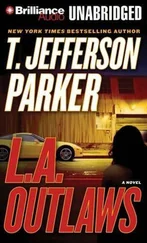‘Even not believing it. That’s what I meant by a question of principles. Of course I would almost say that, more than a question of principles, it was a question of character. We might say that I am a pre-emptive pessimist: I always expect the worst. That’s why I enjoy the best more. Or that’s what I believe.’
‘After dropping off Zarco at the prison, Tere asked me to take her home. I agreed without a word and we crossed the city one last time that Monday from one edge to the other, in silence, while the sun came up and people started going to work. It was daytime when I stopped the car in front of the building where Tere lived, and an almost summery light blazed against the white façades of the houses of Vilarroja. It must have been seven-thirty or eight o’clock. I had barely spoken a word since the slap Tere had given me in La Creueta to make me shut up and convince me to wait for Zarco, and his insults and threats were still stinging; besides, I didn’t like the idea that Tere might ask me about what Zarco had said about my participation in the robbery of the Bordils branch of the Banco Popular. So I don’t know if what I said to Tere next was a way of alleviating the sting or of avoiding uncomfortable questions (or both at once). Turning to face her I asked: How did you know where to look for Zarco? Tere didn’t answer; she was pale and ravaged by the sleepless night. I asked: Is it true you hadn’t seen him this weekend? Tere continued not answering and, increasingly furious and fired-up (perhaps still under the effects of the line of coke I’d snorted in La Creueta), I took the opportunity to let off steam. And another thing, I said, do you think I’m a dickhead and a wanker, too? You think I’m a sanctimonious git and that I’ve been making a fool of myself? Are you using me too? Tere listened to this string of questions without batting an eyelid and, when I finished posing them, she sighed and opened the car door. You’re not going to answer? I asked. With one foot already on the pavement, Tere turned to look at me. I don’t know why you’re talking to me like this, she said. Because I’ve had it up to here, I said sincerely; and I added: Look, Tere, I don’t know if you’ve been with Zarco this weekend or not, and I don’t know what kind of things you’ve got going on: that’s between you and him. Now, if you want what’s between you and me to carry on, that’s going to have to be the way everybody does it; if not, I’d rather we didn’t see each other. Tere thought for a moment, nodded and murmured something, which I didn’t catch. What did you say? I said. Nothing, she answered as she got out of the car. Just that I knew this was going to happen.
‘During that week we didn’t see each other or speak on the phone, but I was reconsidering; on the Saturday I went to Barcelona and spent the afternoon in Revólver and Discos Castelló buying CDs — it had been a while since I’d bought any — and the following week I called her and suggested she come over to my place. I have some new music, I said, and then tried to tempt her by listing what I’d bought. When I finished, Tere said she couldn’t accept the invitation. Are you still angry? I asked. I didn’t get angry, she answered. You were the one who was angry. Well I’m not angry any more, I said; then I added: Have you given any thought to what we talked about? She didn’t ask me what I meant. There’s nothing to give any thought to, she said. Look, Gafitas, this is a mess, and I don’t want any mess. No ties, no commitment. I told you. You were right: we can’t go out like everybody else does, so it’s best that we stop seeing each other. Why can’t we go out like everybody else? I asked. Because we can’t, she answered. Because you’re what you are and I’m what I am. Well then we’ll see each other as we’ve been seeing each other up till now, I conceded. Come over to my place. We’ll have dinner and dance. Like we did before. We had a good time, didn’t we? Yeah, said Tere. But that’s over; I didn’t want it to end, but it’s over. And what’s done is done. Although we carried on arguing for quite a while, Tere had made a decision and I could not get her to change her mind; the decision didn’t mean a break-up, or at least I didn’t take it to mean a break-up: Tere just asked me for time to think, to clarify her ideas, to find out, she said, what she wanted to do with her life. All this sounded a bit hollow to me, or rhetorical, like something you hear in movies, but I had no choice but to accept it.
‘Tere and I stopped seeing each other that summer, just like that. I phoned her at least once a week, but our conversations were brief, distant and functional (mostly we talked about Zarco and María), and, when I tried to guide them onto a more personal terrain, Tere cut me off or listened in silence and then found a reason to hang up straight away. Towards the beginning of August she stopped answering the phone and I imagined she’d gone away on holiday, but I didn’t go up to Vilarroja to find out. Actually I didn’t see her again until Zarco’s wedding day.’
‘Zarco’s wedding?’
‘Zarco and María’s wedding. It was in September, three months after the frustrated escape in La Creueta, and it was the good result of that episode, or the culmination of its good results; so good that for months I could allow myself to think that, for Zarco, that night had been like an alcoholic’s last tumble off the wagon or like the last performance of a dying persona. The fact is that the episode had an immediate therapeutic effect, and in a way revolutionized Zarco’s life. I myself noticed an improvement in his attitude straight away, his mood and even his appearance, but I wasn’t the only one to notice it; the prison reports changed from one week to the next: the guards stopped complaining about him, he went back on the methadone to combat his heroin addiction, started exercising again. This personal readjustment contributed perhaps to the fact that, in spite of the shock of the night of La Creueta, the prison superintendent did not rescind his weekend-release privileges. It’s true that I spent Sunday nights on edge, always hanging by the phone, although it’s also true that Zarco did not return late back to prison again and I did not receive another distressing phone call from the superintendent.
‘But the unmistakable sign that Zarco was another person — a more reasonable and less stuck-up and deranged person, more independent of his own myth, more person and less persona, more suitable for living in liberty — was his wedding to María. At least that’s how I interpreted it. That wedding meant as well that the campaign for his freedom that had been running for nine months was still moving forward. Of course by then, when he was on the verge of getting married, Zarco no longer even bothered to hide the fact that the marriage was a farce; strange as it might seem, this was not for me a proof of Zarco’s cynicism, but rather of his honesty (and, by extension, of mine): according to my clever interpretation, Zarco was using María to get free, but not at the price of deceiving her, or not at the price of entirely deceiving her. As for María, it’s almost as sure that she was still in love with Zarco as it is that deep down she knew her marriage to him was a fraud; although knowing this could sometimes make her uncomfortable, it never managed to calm her impatience to get married: perhaps she thought that in the long run she could make Zarco love her; without a doubt she had become hooked on the drug of celebrity and knew that she couldn’t dispense with Zarco because dispensing with Zarco would be dispensing with fame. In spite of all this, at least a couple of times that summer María told me the doubts she was having about her imminent marriage; my reaction was always the same: cutting her off by playing them down or clearing away her uncertainties at a stroke. A logical reaction, after all, because I knew that marriage to María was not only an indispensable prerequisite for Zarco getting his third-level parole, but also for us to successfully conclude the campaign in favour of his getting a definitive pardon, and I trusted that Zarco’s freedom would represent the end of Zarco’s problems.’
Читать дальше












